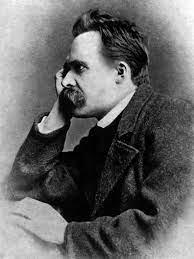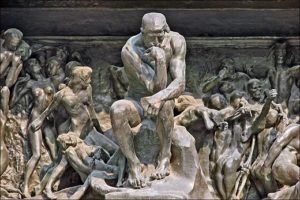139. Solitude and Education, Part 1: Nietzsche and Kierkegaard on Authentic Individuality
Friedrich Nietzsche
What is the purpose of education? Some common answers come to mind: education is a means to gaining more income, finding one’s calling, cultivating an enriched inner life, being a productive citizen, or becoming a life-long learner. These goals need not be mutually exclusive. For example, one can end up making more income by discovering one’s calling as a professor which ends up facilitating life-long learning, providing enriching ideas, and offering opportunities for engaged citizenship.
However, the philosopher Friedrich Nietzsche (1844-1900) would argue that these sensible responses are missing something important. In his book Daybreak (1881) he writes:
“On Education. – I have gradually seen the light as to the most universal deficiency in our kind of cultivation and education: no one learns, no one strives after, no one teaches – the endurance of solitude.” (aphorism #443, translated by Hollingdale)
This is a remarkable claim. But it strikes us as odd. Why the endurance of solitude? In this post series I want to briefly sketch a set of answers based on my efforts to answer this question. The answers are closely connected and tend to revolve around the notion of self-actualization. Taken together, they make a plausible case that the more common goals of education require the endurance of solitude if they are to fully succeed. Of course we need a definition of solitude before we can inquire into its relation to education. Philip Koch, in his wonderful book Solitude: A Philosophical Encounter (Open Court, 1994), provides one that will work for our purposes: “It is a time in which experience is disengaged from other people” (27). Koch claims that other typical features of solitude, like physical isolation, reflectiveness, freedom, and silence, all flow from “the absence of others from one’s experiential world” (27). With this conception of solitude in place, let’s turn to our first claim.
(1) Solitude can help us become authentic individuals.
For Nietzsche, we should endure solitude first and foremost because our inability to do so reveals we have adopted a herd mentality inconsistent with individuality. In section 50 of his book The Gay Science, he writes:
“The argument of growing solitude. – The reproaches of conscience are weak even in the most conscientious people compared to the feeling: “This or that is against the morals of your society.” A cold look or a sneer on the face of those among whom and for whom one has been educated is feared even by the strongest. What is it that they are really afraid of? Growing solitude! This is the argument that rebuts even the best arguments for a person or cause. – Thus the herd instinct speaks up in us.” (translated by Kaufmann)
According to Nietzsche, we all fear solitude and this fear can override our reason and lead us to “rebut”, rather than accept, good arguments and people in order to conform. What is interesting is that we develop this herd mentality in response to our educators and those for whom we have been educated. Education, rather than developing individuality, can all too often thwart it. But now consider this quotation:
“In solitude — Those who live alone do not speak too loud nor write too loud, for they fear the hollow echo—the critique of the nymph Echo. And all voices sound different in solitude.” (The Gay Science, section 182, translated by Kaufmann)
Those who can embrace solitude don’t fear the critical judgments of the herd. Rather, they fear hearing the hollow echo of their own voice – an echo which, to be sure, is often revealed to be an echo of others. The key is that one can hear this lack of substance when alone. Soren Kierkegaard (1813-1855) makes a similar point in his book Two Ages (Princeton) when he identifies silence with authentic selfhood or “inwardness”:
Soren Kierkegaard
“What is it to chatter? It is the annulment of the passionate disjunction between being silent and speaking. Only the person who can remain essentially silent can speak essentially, can act essentially. Silence is inwardness” (97). Indeed, the “inward orientation of silence is the condition for cultured conversation” (99); without it, genuine conversation between individuals degrades into “trivial rattling and name-dropping” (99) which signifies a lack of passion and authenticity. No wonder then that the person who lacks inwardness or individuality “dreads the moment of silence, which would reveal the emptiness” (98).
And in The Sickness Unto Death (Penguin, 1989), he writes:
“In general, the urge for solitude is a sign that there is after all spirit in a person and a measure of what spirit there is. So little do chattering nonentities and socializers feel the need for solitude that, like love-birds, if left alone for an instance they promptly die. As the little child must be lulled to sleep, so these need the soothing hushaby of social life to be able to eat, drink, sleep, pray, fall in love, etc.” (95)
These quotations help us see solitude as a condition for something education should presumably help provide: the cultivation of individual thought and expression. If we are always chattering and worrying about how to fit in then our minds may be determined by external social forces. But if we can learn to embrace solitude, that is, if we can learn to embrace those times when we are free from others, then we have a chance to focus, reflect, and creatively develop our unique voice.
This detail from Auguste Rodin’s The Gates of Hell (created 1880-1917) beautifully illustrates this contrast between an individual’s thoughtful solitude and the masses:
For a second related reason why solitude may be integral to education go here.


